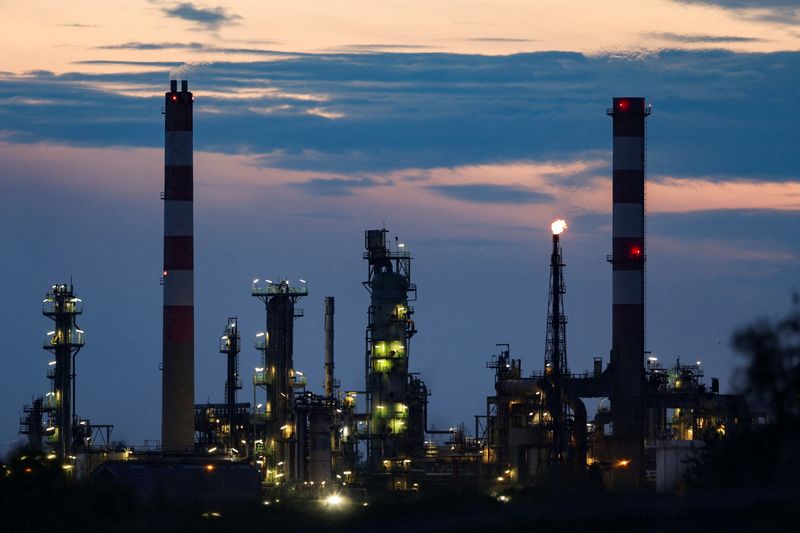By Georgina McCartney
HOUSTON (Reuters) -Oil settled up 2% on Thursday after the European Central Bank opted to cut interest rates, spurring hopes that the Fed will follow suit, and OPEC+ ministers reassured investors the latest oil output agreement could change depending on the market.
Brent crude futures settled $1.46 higher or 1.86% at $79.87 a barrel. U.S. West Texas Intermediate crude futures settled up $1.48 or 2% at $75.55.
On Thursday, the European Central Bank went ahead with its first interest rate cut since 2019, citing progress in tackling inflation but cautioning the fight was far from over.
Denmark's central bank then lowered its benchmark interest rate by 25 basis points to 3.35%.
Analysts in the U.S. saw the European rate cuts as a likely precursor to Fed rate cuts.
Lower fuel costs and an easing of post-pandemic supply snags have helped drive inflation down to 2.6% in the 20 countries using the euro, from 10% in late 2022.
Investors are now less certain than they were a few weeks ago that inflation has retreated enough for the ECB to institute a major easing cycle. In the U.S., economists predict the Federal Reserve will cut rates in September, according to Reuters' May 31-June 5 poll.
"Today the ECB rate cuts are helping, and casting a view that the Fed will finally follow suit here in the U.S. as well which is supportive, but both central banks are cutting in the face of a slowing economy which is not necessarily supportive of oil demand,” said John Kilduff, partner at Again Capital.
The number of Americans filing new claims for unemployment benefits rose last week, and first-quarter unit labor costs rose by less than previously thought, the Labor Department said.
While this shows a cooling labor market, it is unlikely to push the Fed to start rate cuts.
Meanwhile, trading house Trafigura's chief economist Saad Rahim said the OPEC+ decision to phase out some output cuts, combined with strong fuel supplies, has driven oil prices lower.
OPEC+, the Organization of the Petroleum Exporting Countries and allies, agreed on Sunday to extend most production cuts into 2025 but left room for voluntary cuts from eight members to be unwound gradually.
Saudi Energy Minister Prince Abdulaziz bin Salman said on Thursday that OPEC+ can pause or reverse production increases if it decides the market is not strong enough.
And Russian Deputy Prime Minister Alexander Novak said the group might adjust the deal if necessary, adding that the post-meeting price drop was caused by misinterpretation of the agreement and "speculative factors".
"Oil markets have over-reacted to the mildly negative OPEC+ meeting outcome. Demand indicators have certainly softened somewhat recently, but are not falling off a cliff," Barclays analyst Amarpreet Singh wrote in a note.
Elsewhere, a merchant vessel reported that an explosion took place near it in the Red Sea on Thursday about 19 nautical miles west of the Yemeni port city of Mokha, British security firm Ambrey said.
The vessel fit the target profile of Yemeni Houthi militants, Ambrey said in a note. Militants have attacked ships off the country's coast for several months in solidarity with Palestinians fighting Israel in Gaza.

The vessel was en route from Europe to the United Arab Emirates.
“This puts more risk on top of a market that was already nervous,” said Phil Flynn, an analyst at Price Futures Group. “And if it turns out to be an oil tanker, this will probably raise the stakes,” he added.